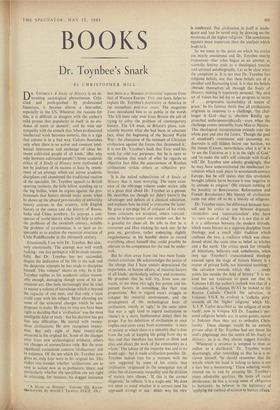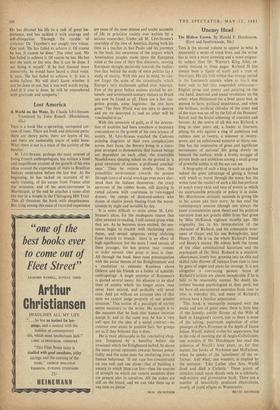BOOKS
Dr. Toynbee's Snark
By CHRISTOPHER HILL
DR. TOYNBEE'S A Study of History is an in- teresting sociological phenomenon. Criti- cised and pooh-poohed by professional historians, it became almost a best-seller, especially in the US. Whatever the reasons for this, it is difficult to disagree with the author's mild protest that popularity in itself 'is no evi- dence of merit or demerit% and he wins our sympathy with the remark that 'when professional intellectual work becomes esoteric, this is a sign that culture is in a bad way. Culture flourishes only when there is an active and constant intel- lectual intercourse and exchange of ideas be- tween cultivated people of all kinds.' (But why only between cultivated people?) Some academic critics of A Study of History were motivated if not by jealousy of its success at least by resent- ment of an attempt which cut across academic disciplines and abandoned the traditional caution of the specialist. Dr. Toynbee appeals to British sporting instincts, the little fellow standing up to the big bullies, when he argues against the pro- fessionals that history should make sense; when he shows up the absurd provinciality of university history courses in this country, with English history at the centre and the history of Russia. India and China nowhere. To attempt a con- spectus of world history which will help to solve the problems of the twentieth century, notably the problem of co-existence, is at least as re- spectable as to analyse the manorial structure of Little Puddlecombe in the thirteenth century.
Emotionally I am with Dr. Toynbee. But alas: only emotionally. The attempt was well worth making: one day-perhaps it will be made success- fully. But Dr. Toynbee has not succeeded, despite the dedication of his life to the task and the desperate attempts he has made to discipline himself. This volume* shows us why. In it Dr. Toynbee replies to his academic critics reason- ably enough, damaging though some of his ad- missions are. One feels increasingly that he tried to master a volume of knowledge which is beyond the capacity of one man, and that only a team could cope with his subject. More alarming are some of the structural changes which he now proposes to make. He may or may not have been right in deciding that a 'civilisation' was the most intelligible field of study : but his decision has got him into difficulties. He started with twenty- three civilisations. He now recognises twenty- nine. But only eight of these twenty-nine occurred in his original list. Some of the changes arise from new archaeological evidence, others are changes of nomenclature only. But the most significant corrections concern 'civilisations' still in existence. Of the ten which Dr. Toynbee now gives us,•only four were in his original list. This makes one wonder whether 'civilisations' are as easy to isolate now as in prehistoric times; and particularly whether the specialists are not right in criticising, for instance, his dogged insistence * A STUDY OF HISTORY: VOLUME XII. RECON- SIDERATIONS. By Arnold J. Toynbec. (O.U.P., 45s.) that there is a 'Russian civilisation' separate from that of Western Europe. This, one fears, helps to explain Dr. Toynbee's popularity in America in the immediate post-war years. The magazine Time introduced him to its public in the words `The US must take over from Britain the job of trying to solve the problem of contemporary history. The US must, in Britain's place, con- sciously become what she had been, in reluctant fact, since the beginning of the Second World War: the champion of the remnant of Christian civilisation against the forces that threatened it.' It is not Dr. Toynbee's fault that Time used his work for cold war purposes: but he is open to the criticism that much of what he regards as objective fact (like the separateness of Russian civilisation) strikes others as subjective pre- ference.
It is the naked subjectivism of A Study of History that is most worrying. The mere exist- ence of the 690-page volume under review tells us a great deal about Dr. Toynbee as a person. He describes (as though we didn't know!) the advantages and defects of a classical education, and explains how he tried io overcome the latter. He gives a ten-page list of critiques of his work. Some criticisms are accepted, others rejected: some he believes cancel one another out. But he is grateful for them all. He tells us that he is irreverent and likes sticking his neck out. So he goes on, garrulous, rather endearing, slightly megalomaniac in his humble desire to record everything about himself that could possibly be relevant to his competence for the task he under- took.
But he shies away from the two most funda- mental criticisms. He acknowledges the justice of 'the charge that I have unduly depreciated the importance, in human affairs, of material factors of all kinds,' particularly military and economic. He promises that he will 'try, from now on- wards, to see these two ugly but potent and im- portant factors in something like their true proportions.' But to regard man's struggle to conquer his material environment, and the development of the technological basis of civilisation, merely as 'ugly,' in the same sense that war is ugly (and to regard institutions as `slums') is a more fundamental defect than he grasps. For his definition of civilisation at once implies and turns away from economics: 'a state of society in which there is a minority that is free from the task of keeping life going from day to day, and that therefore has leisure to think and plan and direct the work of the community as a whole.' The labour of the majority was and is no doubt ugly: but it made civilisation possible. Dr.
Toynbee indeed toys for a moment with the view suggested by some of his critics, that civilisation 'originated in the emergence not of cities, but of economic inequality and the division of society into classes.' If this is the correct diagnosis,' he reflects, 'it is a tragic one.' He does not seem to mind whether it is correct (and his approach wrong) or not: either way his view is confirmed, that civilisation in itself is inade- quate and 'can be saved only by drawing on the resources of the higher religions.' The conclusion appears more important than the analysis which leads to it.
So we come to the point on which his critics are nearly unanimous and Dr. Toynbee utterly impenitent—that what began as an attempt at scientific history ends as a theological treatise and spiritual autobiography. Let us be clear what the complaint is. It is not that Dr. Toynbee has religious beliefs, nor that these beliefs are of a peculiar and fluctuating kind. It is that his beliefs obtrude themselves all through the Study of History, making it hopelessly personal. 'My own set of values has led me to see progress in terms of . . . progressive accessibility of means of grace.' In his famous thesis that all civilisations originate in response to a challenge, 'the chal- lenger is God—that is, absolute Reality ap- proached anthropomorphically—even when the challenge comes ostensibly from Man or Nature.- This theological interpretation extends over the whole past and into the future. 'Though the goal of mankind's continuous and increasing en- deavours is still hidden below our horizon, we [he means I] know, nevertheless, what it is.' It is 'to see the Universe as it is in the sight of God,' and `to make the self's will coincide with God's will.' Dr. Toynbee now admits, grudgingly, that he may have underestimated the intellectual re- volution which took place in seventeenth-century Europe, but he still insists that this revolution brought infinite harm because it was 'negative in its attitude to religion.' (He retracts nothing of his hostility to Renaissance, Reformation and French Revolution.) His history of civilisation turns out after all to be a history of religions.
Dr. Toynbee states the difference between him- self and his critics as one between dogmatic rationalists and Iransrationalists' who have 'ail open state of mind.' But it is not that at all. It is a difference between the modern attitude, which treats history as a separate discipline from theology, and a much older tradition which confuses the two, a tradition which was aban- doned about the same time as belief in witches and a flat earth. The critics speak for virtually all historians, believers and unbelievers, when they say 'Toynbee's transcendental theology enacted upon the stage of human history is a matter of private faith, not historical sociology'; the salvation towards which this . . . study points lies outside the field of history.' It is un- kind but not irrelevant to point out that in Volumes 1-III the author's outlook was that of a rationalist; in Volumes IV-VI he looked to the Roman Catholic Church for salvation; in Volumes VlI-X he evolved a 'catholic piety'. towards all the 'higher religions' which Mr.
A. J. P. Taylor described as 'the religion of mish- mash% now in Volume XII Dr. Toynbee's 'per- sonal religious beliefs are, in some points, nearer to Judaism than they are to orthodox Chris- tianity.' These changes would be an entirely private affair if Dr. Toynbee had not thrust his soul's pilgrimage into the centre of his Study of History: as it is, they almost suggest frivolity.
`Whenever a reviewer is tempted to treat an author as a dartboard,' Dr. Toynbee writes disarmingly, after reminding us that he is a re- viewer himself, 'he should remember that the missile which his hand is itching to lance is not a dart but a boomerang.' These sobering words remind me to end by stressing Dr. Toynbee's many admirable qualities. He hates all racial
intolerance; he has a strong. sense of obligation to humanity; he believes in the legitimacy of `applying the method of science to human affairs.' He has devoted his life to a task of great im- portance, and has tackled it with courage and self-abnegation. 'Through the rumble of criticism' Dr. Toynbee's ear caught two voices. One said, 'He has failed to achieve it. Of course he has. It cannot be done.' The other said, 'He has failed to achieve it. Of course he has. He has not the tools or the wits. But it can be done. I am doing it myself.' If he had listened more attentively, he would have heard a third voice. It says, 'He has failed to achieve it. It was a noble failure. We still don't know whether it can be done or not, but it was well worth trying. And if it ever is done, he will be remembered with gratitude and sympathy.'







































 Previous page
Previous page